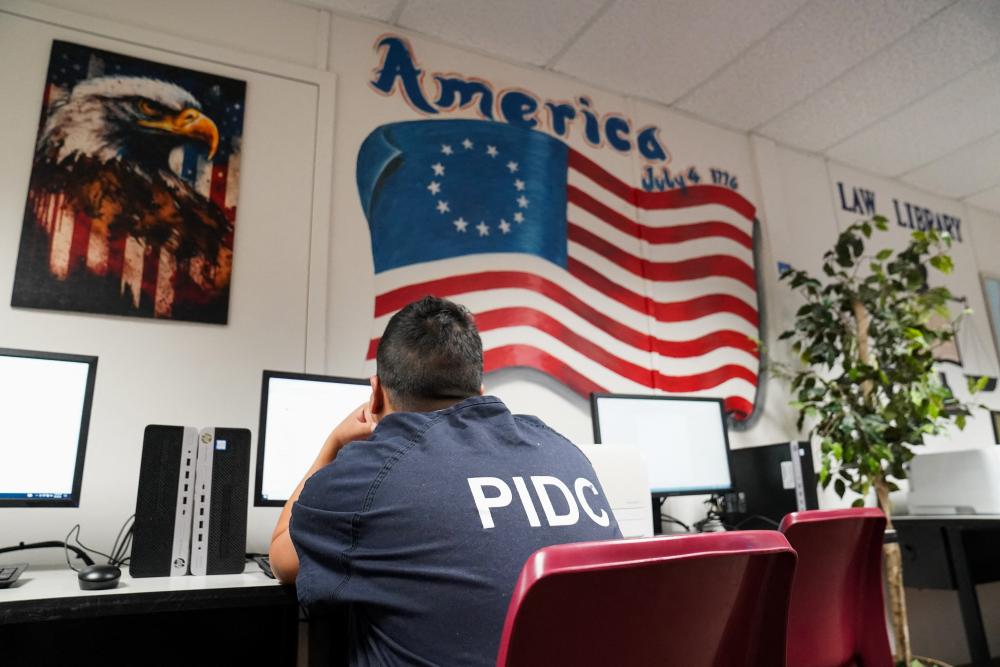The private immigration detention industry in America is unexpectedly thriving under the Biden administration, with a potential future windfall anticipated should Donald Trump return to office. Reports have surfaced that Trump’s plan to deport millions and enhance the use of private immigration prisons is already finding solid financial footing due to the Biden administration’s policies. Despite continued criticism from watchdog groups and human rights advocates regarding the often “horrific” conditions in these facilities, the Biden administration has extended contracts with these privately-run centers under Immigration and Customs Enforcement (ICE). This decision occurs amidst significant pushback from Congress and advocacy groups calling for the closure of these detention centers due to ongoing violations and abuses.
In light of these developments, critics highlight that the U.S. government allocates over $3 billion a year for maintaining the largest immigration detention system globally, with many of these funds flowing to private contractors. The detention facilities are reported to be sites of medical neglect, abusive treatment, punitive solitary confinement, and violations of basic rights, leading to preventable deaths. Data indicates a sharp increase in the number of individuals being held in ICE detention centers under the Biden administration, suggesting a retreat from any progressive stance on immigration policy and their treatment. The administration plans to increase funding to support a detention capacity for 41,500 individuals daily, despite numerous complaints and documented issues within these facilities.
The Office of the Inspector General for the Department of Homeland Security (DHS) has conducted inspections revealing severe deficiencies in several ICE facilities, including critical shortages in medical care and sanitation violations. High-profile problem areas include the Desert View facility in California, run by GEO Group, which has faced severe allegations of mental health treatment neglect, including an incident involving a mentally ill detainee. Despite such egregious issues and letters from prominent senators urging a halt to private detention contracting, the Biden administration has granted five-year extensions for several problem-laden facilities, raising concerns about its commitment to reform and improved conditions.
Various instances of dangerous environments and systemic abuse have emerged from ICE’s ongoing reliance on private detention centers. Facilities like the Port Isabel detention center and the Irwin County detention center, infamous for horrific testimonies of abuses, have either seen contract extensions or direct transfers of detainees to similar problematic facilities. These actions suggest a troubling pattern where the Biden administration’s rhetoric on advocating for humane immigration practices fails to translate into substantive action against the private prison industry. The troubling trajectory reveals a continuity of practices that many advocates thought would be reformed under a Democratic administration.
Additionally, several states, including New Jersey, are battling to limit or eliminate the use of private immigration detention, signaling a disconnect between state-level actions and federal policies. Private companies, namely GEO and CoreCivic, are positioning themselves for new contracts, leading to criticism from local lawmakers who express concern over the inhumane treatment reported in these facilities. A history of violence, medical neglect, and poor living conditions in various ICE detention centers has not dissuaded the federal government from supporting these privatized systems, which advocates argue goes against the public interest and state policies aimed at protecting the wellbeing of detainees.
Overall, as the Biden administration continues to extend contracts with private detention contractors, the troubling realities within these facilities lay bare a systemic issue. With ongoing documented abuses that reach across multiple facilities, it raises critical questions about the administration’s commitment to reversing the trends of the past, especially in light of the mounting evidence of informality and abuse faced by detainees. The political landscape surrounding immigration detention remains fraught with challenges, pushing advocates like Senator Cory Booker to remind the administration that it promised to fundamentally reform how immigration detention is handled—something that appears to remain unfulfilled in practice. As several contracts are prolonged, without significant changes in conditions or objectives, the status quo underlines a deeper issue within America’s immigration enforcement framework, revealing a challenging path ahead for reform advocates.

